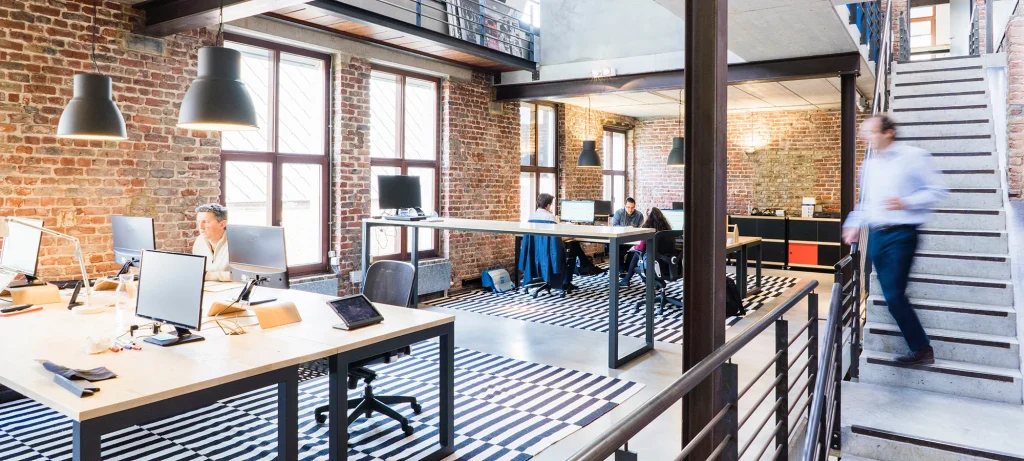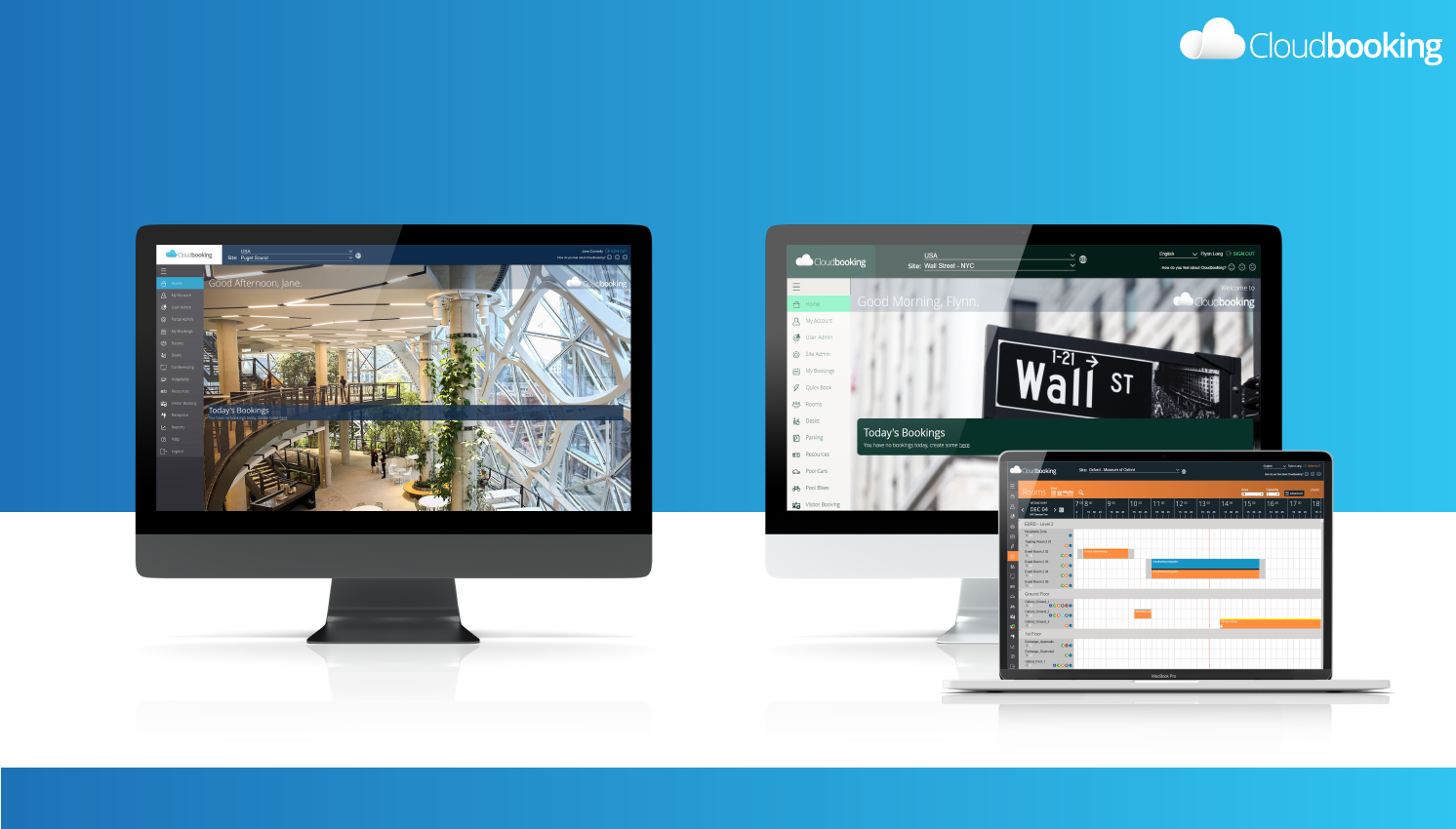
Desk hoteling vs hot-desking, what’s the difference? Desk hoteling allows employees to book a particular workstation when they arrive at the office. Hot desking is similar, in that people are free to use any workstation they choose, but there is no formal booking system.
The coronavirus pandemic has transformed the way we work. Remote working, previously the exception rather than the rule, has become the norm, and many businesses have adopted a hybrid model of working since employees began returning to the office. This trend looks set to continue long-term as it offers benefits for both employers and employees. According to new research by Microsoft in conjunction with YouGov, more than half (51%) of UK workers would consider quitting their job if their employers’ removed the option for hybrid working. If employers want to avoid the impact of “the great resignation,” they must remain competitive when it comes to offering flexibility and work-life balance.
This ongoing shift to hybrid working has driven greater interest in two workplace options for agile working and desk sharing — desk hoteling or desk booking and hot desking. A report published in January by the JLL property group revealed that 37% of organizations globally have post-pandemic plans to increase their use of co-working or flexible space.
Which option is best for your organization?
What is desk hoteling?
Desk hoteling, also known as desk booking, hoteling, or office hoteling, is an office management strategy that provides flexible working arrangements to suit dynamic schedules.
Anyone granted access to an organization’s desk hoteling software can book unassigned office space. This allows employees to reserve a desk before coming to work, so they can access their preferred space upon arrival. The hoteling system can also be used to book meeting or conference rooms and other spaces in the office building.
What is hot desking?
Hot desking is a way of organizing the workplace so that desks are not permanently allocated to one individual but instead can be used by different people as needed.
Unlike desk hoteling, workspaces are used ad-hoc, rather than via a formal booking system. The flexibility of hot-desking encourages interaction between colleagues both within and between departments. Hot desking can be used for private and shared office spaces.
Related Reading: 10 of the Best London Hot Desk Spots for Remote Workers
Desk hoteling and hot desking compared
The two systems have some similarities, but there are important differences between them too. Which one is right for your business and its people?
This may depend on why your company is interested in establishing an office management strategy that promotes a more agile working environment. Is the primary goal to protect peoples’ health or to cut real estate costs? Or perhaps the leadership team is eager to attract and retain the best talent?
Whatever the motivation, an effective space-sharing strategy will benefit any organization by cutting costs and allowing employees to work where they can perform their best at any given time. To choose the best system for your workplace, you will need to weigh up the pros and cons based on the specific requirements of the business and its people.
Benefits of desk hoteling
Desk hoteling or desk booking is a great way to organize the use of workspace in advance.
-
Reduce costs
Renting office space is one of the biggest business costs, aside from staffing. Desk hoteling makes the best use of the available real estate. Rather than allocating each employee their own desk, you can have multiple people using the same workstations at different times. Business costs are reduced as there is less time when workspaces are not being used.
-
Increase employee engagement
Engaged employees are more productive, happier in their work, less likely to take time off sick, and will be more loyal to the company. A business with an engaged workforce will be better placed to attract and retain top talent, resulting in lower recruitment and training costs. Giving employees control over where and how they work can boost their level of work satisfaction, which will drive greater engagement.
-
Boost employee morale
Allowing employees to book the workspace they need for a particular time or task ensures they have everything they need to work productively and comfortably. Without the requirement to turn in to the office at nine to five every day, employees can avoid unnecessary commutes and the feeling of monotony that can arise from being chained to the same desk, day in and day out.
A desk hoteling system, when used as part of a hybrid approach to working, also provides the flexibility employees may need to manage commitments and challenges outside of work, such as ill-health and caring for family members. People who feel valued and trusted by their employer to manage their own work time will have higher morale than those tied to a rigid system of attendance at the same workspace every day.
-
Promote positive working relationships
Giving employees the freedom to choose where they work also allows them to decide who they work with. If a group of colleagues is collaborating on a project, they can book desks together to share ideas, update one another on their progress, and troubleshoot any issues that arise.
Desk hoteling also encourages employees to build relationships with colleagues throughout the company, not just those in their department. Providing the opportunity for people with diverse skills, experience, and knowledge to collaborate can spark creative ideas and problem-solving that might not otherwise have emerged. Furthermore, an organization in which employees understand what everyone does and who to go to for support will be much stronger and able to thrive in challenging times than one where everyone works in silos, only interacting with people in similar roles.
-
Flexible and scalable
Over the past two years, business owners have been forced to adopt an agile approach to working if they hadn’t done so before. As government regulations on business operations and the movement of people constantly evolved, leaders had to act quickly to respond to changes and ensure the ongoing success of their organization. This more flexible and responsive approach to work is now the norm for many organizations.
Desk hoteling supports a more agile way of working and allows organizations to scale their workspace and equipment as they grow. If the workforce expands or shrinks, workspaces can be added or removed as necessary.
Challenges of desk hoteling
There are many advantages of desk hoteling or desk booking, but there are some things to be aware of before transitioning to this system of office management.
-
Preparing the setup
A hot-desking system can be established immediately. Employees can turn up and choose any available workstation on an ad-hoc basis. In comparison, desk hoteling requires an initial investment of time and money in establishing an efficient setup. You’ll need an accurate floorplan of the building that shows what workspaces are available and workplace management software that offers the capabilities you need. However, once you’re up and running, this system is typically a lot more efficient than hot desking.
-
Limited availability
If a high percentage of the workforce elects to come into the office on the same day, there is the possibility that there may not be enough available workstations to accommodate the demand. If you’ve taken the time to prepare an efficient setup and have an effective hybrid-workspace management system, this situation should rarely arise.
-
Emergencies and unexpected meetings
An advanced desk-booking system can make it difficult to meet the needs of employees who have an unexpected meeting crop up or an urgent situation that requires a shared workspace. If rooms and desks are booked up months in advance, there may be no availability to reserve a space at little notice. This issue can be avoided by creating “zones” in the workplace and reserving at least one of these for emergency bookings only.
-
Onsite staff
Some employees, such as maintenance staff, will need to be onsite most of the time. They may prefer to have a permanent workspace rather than having to repeatedly book a desk or move between spaces if there is no availability for their preferred area. Again, this can be easily factored in when setting up a workspace management system by blocking out some areas or amending permissions so that only specific employees can book those spaces.
Benefits of hot desking
Could a more ad-hoc system be the ideal solution for your business?
-
Lower overheads
As with desk hoteling, a major benefit of hot-desking is the cost savings. With hybrid working, where employees split their time between workspaces, there’s no need to provide a dedicated workstation for every person. Sharing desks makes the best use of the space and helps to keep overheads down.
-
Empowered employees
According to a recent hybrid working survey of over 5,000 people by the Harvard Business Review, 59% of respondents stated that “flexibility” is more important than salary or other employee benefits. However, the data also showed that flexibility is only deemed to be a valuable offering if individuals have the freedom to exercise it in the way that fits them best — 61% of employees said that they would prefer if management allowed them to choose when to come into the office and when to work from home. Hot desking allows employees to work where they want, and this sends a strong signal of trust from the leadership to team members.
-
Flexibility
Hot desking allows employees to find a suitable workspace at short notice. As there isn’t an advance booking system, there is no risk of being unable to book a space if something urgent crops up.
However, the flip side of this is that the most suitable spaces may have been taken, so sitting with colleagues or using a private meeting room for an unexpected client meeting may be problematic.
-
A cleaner and more organized workspace
When employees have no dedicated desk, they cannot allow clutter and dirt to accumulate. This results in a more organized and hygienic workplace. Not only does this promote good health, but it allows people to focus on the task at hand with minimal distractions.
Challenges of hot desking
Hot desking can present challenges as well as benefits. In a recent LinkedIn poll, 75% of respondents selected “no” when asked if they enjoy hot desking at work. Why?
-
Lack of privacy and security
Without any private space to call their own, some employees may worry about their privacy being compromised. This will be especially true in workplaces where there are a lot of confidential documents changing hands, either in hard copy or stored on laptops.
A desk-booking system provides a record of who has been working where at any given time. It also allows employees to book a private room if they know they will be handling sensitive information. Therefore, the same issue does not arise.
-
Workspaces feel impersonal
Some employees miss the opportunity to create their own space at work. Adding family photos or a favorite plant can create a familiar and comforting space. With hot desking, this is not an option.
The Canadian news outlet, The Globe and Mail, interviewed more than a dozen clerical workers in Toronto about their work lives, and many said their workspaces feel impersonal because of hot desking. Having no idea who they would be sitting next to each day or where they would be sitting acted as a disincentive to coming into the office.
While desk hoteling also entails sharing workspaces, the advance booking system makes it easier for companies to create work zones and block some areas off from the reservation system. This allows the leadership team to tailor their approach to individual needs, for example, by setting aside some permanently allocated work areas for the people who need them.
-
Insufficient space
Without the option to book a suitable workspace in advance, employees are left to race to the office and scrabble to secure the room or desk they need. On days when lots of people decide to work from the office, there may be insufficient space to accommodate everyone, and employees could be left with a work area that does not meet their needs.
In comparison, desk hoteling allows people to book the space they need well in advance. When they have a particular office space need, employees can secure it well ahead of time and avoid being left with an unsuitable or insufficient work area.
-
More staff sickness
Although hot desking promotes a less cluttered work environment, it is harder to prevent sickness from being transmitted among workers. Computer keyboards and desk surfaces are a haven for bacteria and germs. When people frequently switch between workstations, it becomes easy to pick up an illness which may result in higher company costs for sick pay and cover staff.
Desk hoteling vs hot desking: key takeaways
Desk hoteling and hot desking are similar hybrid workspace-management systems, but they have important differences.
Both help businesses cut costs by optimizing the utilization of the workspace. However, the ad-hoc nature of hot desking can result in employees struggling to find sufficient or suitable workspaces, and many worry about the loss of privacy and security.
Desk hoteling or desk booking is a more sophisticated system as it allows organizations to carefully control which work areas are available for booking, when, and by who. Employees also benefit because they can book the space they need well ahead of time, rather than scrabbling to bag a desk or meeting room when they need it.
Find out how Cloudbooking can help you integrate a desk hoteling or desk booking system in your workplace that will promote employee engagement and productivity while ensuring optimum utilization of the space available. Contact us now for a no-obligation product demo.


